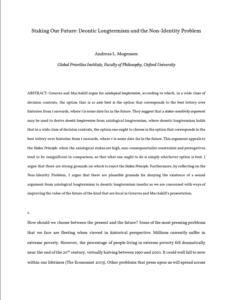Staking our future: deontic long-termism and the non-identity problem
Andreas Mogensen (Global Priorities Institute, Oxford University)
GPI Working Paper - No. 9-2019
Greaves and MacAskill argue for axiological longtermism, according to which, in a wide class of decision contexts, the option that is ex ante best is the option that corresponds to the best lottery over histories from t onwards, where t is some date far in the future. They suggest that a stakes-sensitivity argument may be used to derive deontic longtermism from axiological longtermism, where deontic longtermism holds that in a wide class of decision contexts, the option one ought to choose is the option that corresponds to the best lottery over histories from t onwards, where t is some date far in the future. This argument appeals to the Stakes Principle: when the axiological stakes are high, non-consequentialist constraints and prerogatives tend to be insignificant in comparison, so that what one ought to do is simply whichever option is best. I argue that there are strong grounds on which to reject the Stakes Principle. Furthermore, by reflecting on the Non-Identity Problem, I argue that there are plausible grounds for denying the existence of a sound argument from axiological longtermism to deontic longtermism insofar as we are concerned with ways of improving the value of the future of the kind that are focal in Greaves and MacAskill’s presentation.
Other papers
Longtermist political philosophy: An agenda for future research – Jacob Barrett (Global Priorities Institute, University of Oxford) and Andreas T. Schmidt (University of Groningen)
We set out longtermist political philosophy as a research field. First, we argue that the standard case for longtermism is more robust when applied to institutions than to individual action. This motivates “institutional longtermism”: when building or shaping institutions, positively affecting the value of the long-term future is a key moral priority. Second, we briefly distinguish approaches to pursuing longtermist institutional reform along two dimensions: such approaches may be more targeted or more broad, and more urgent or more patient.
Shutdownable Agents through POST-Agency – Elliott Thornley (Global Priorities Institute, University of Oxford)
Many fear that future artificial agents will resist shutdown. I present an idea – the POST-Agents Proposal – for ensuring that doesn’t happen. I propose that we train agents to satisfy Preferences Only Between Same-Length Trajectories (POST). I then prove that POST – together with other conditions – implies Neutrality+: the agent maximizes expected utility, ignoring the probability distribution over trajectory-lengths. I argue that Neutrality+ keeps agents shutdownable and allows them to be useful.
Towards shutdownable agents via stochastic choice – Elliott Thornley (Global Priorities Institute, University of Oxford), Alexander Roman (New College of Florida), Christos Ziakas (Independent), Leyton Ho (Brown University), and Louis Thomson (University of Oxford)
Some worry that advanced artificial agents may resist being shut down. The Incomplete Preferences Proposal (IPP) is an idea for ensuring that does not happen. A key part of the IPP is using a novel ‘Discounted Reward for Same-Length Trajectories (DReST)’ reward function to train agents to (1) pursue goals effectively conditional on each trajectory-length (be ‘USEFUL’), and (2) choose stochastically between different trajectory-lengths (be ‘NEUTRAL’ about trajectory-lengths). In this paper, we propose…

